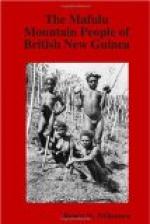If the chief on acquiring office by inheritance is a child, or not qualified to act (e.g., unmarried), he is nevertheless chief; but some person will usually act as his guardian, and perform his functions for him until he has qualified. This person will probably be one of the young chief’s eldest male paternal relations (e.g., the eldest living brother of the last previous chief), and will presumably be a person of consequence; but he will not necessarily be one of the sub-chiefs.
All the above observations concerning the hereditary nature of a chief’s office and subsequently explained matters apply also to the case of a sub-chief, except that there is no ceremony on his resigning office in favour of his successor, and that the usurpation of the office of a sub-chief, of the occurrence of which I found no record, would perhaps be more difficult of accomplishment. In the event of a village throwing off an offshoot village, or itself splitting up into two villages, the then existing sub-chief of the original village would continue his office in it or, in case of a division, in one of the villages resulting from the split, and the other village would have for its sub-chief some one of the ake-baibe of the original village, probably the one who was most active in organising the split. On the other hand, if several villages united into one, one only of their sub-chiefs could be sub-chief of the village arising from the amalgamation, and the others would sink to the rank of ake-baibe.
The observations concerning the hereditary nature of a chiefs rank also apply to the ake-baibe. I have no information concerning them on the other points; but these are not so important as regards these people, who have no official position and have no duties to perform.
There are, as will be seen hereafter, a number of persons who are employed from time to time to perform various acts and functions of a ceremonious or superstitious character, notably the man who has the important duty of killing pigs at feasts; but these men are not by virtue of their offices or functions either chiefs or sub-chiefs, or even notables or important personages. It is in each case a matter of the specific personal power which the man is believed to possess. Any of them might happen to be an important personage, and the pig-killer, whose office is a prominent one, would probably be one; though in his case muscular strength would, I understand, be an important element of qualification. [59]
CHAPTER VI
Villages, Emone, Houses and Modes of Inter-Village Communication
Villages and Their Emone and Houses.




